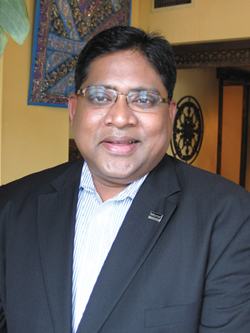By Janice Nesamani
NORTHWEST ASIAN WEEKLY

Sukarya’s field team spreads Covid-19 awareness in the slums of Gurugram, India under its Urban Slum Health Action program. (Photo provided by Debadutta Dash)
For the first time since April, graphs tracking Covid-19 cases in India are starting to dip. Figures reported on May 25 are still alarmingly high—26,948,874 Covid-19 cases and 307,231 deaths. If you have an Indian colleague, neighbor, or friend, chances are they have lost a loved one or had to helplessly wait for news as someone close battles the illness back home. And yet, theirs are the families with agency.

Debadutta Dash
Debadutta Dash, secretary and founding member of Sukarya, a non-government organization that primarily works to provide maternal and child healthcare to the most marginalized Indians, recently returned from the Southeast Asian country, where scenes of the healthcare crisis prompted him to action.
In the first week of April, Dash received a call from India. It was his mother’s neighbor, calling to tell him that she needed medical attention due to a bad fall. With special permission from the government of India, he took a bubble flight home to the eastern state of Orissa.
“Delhi airport had strict screening for variants coming from South Africa and the UK, and even I had to go through the process though I was fully vaccinated. They even used face shields for domestic travel,” Dash said.
But closer to home, he noticed complacency.
“People were not wearing masks, my hotel hosted a wedding with at least 150-200 guests despite a restriction on gatherings,” he said. The complacency was a result of the low infection and mortality rates during the first wave that the government prematurely called a victory against the virus.
While in India, it took a week for the situation to go from normal to disastrous.
“I had to get my mother vaccinated and come back by April 23, but my flights were rescheduled, and the capital turned into a ghost town before my eyes,” Dash said.
As the healthcare system collapsed under the weight of rising infections, the sick lined up outside hospitals that were over capacity, struggled to find oxygen, and people waited for vaccines that were in short supply.
Dash was worried. His association with Sukarya, which works for the poorest of the poor, taught him that it was this group that needed to be kept safe.
India’s slums are home to about 10-15% of India’s population, the labor force of the country that is dependent on daily wages and have little or no savings. In Delhi, they are filled with refugees from Bangladesh and migrant laborers from neighboring states, many of whom had to return home when the cities they worked in shut down during the first wave.
Sukarya works with a small cluster of 15 slums in the National Capital Region of Delhi, catering to about 50,000 residents.
“This problem is not going to end soon. If the country continues vaccinating people at its current rate, it will take them 3.5 years,” Dash said. “You cannot expect this marginalized population, that hardly gets any attention from anyone even though they are the backbone of the country’s economy, to stay within the confines of their slums for this prolonged period,” Dash said.
And yet if desperation forces them to step out and even one of them brings the virus in, the situation could turn catastrophic as the virus could spread rapidly. To help contain the situation, Sukarya has adopted a four-pronged approach to safeguard the slums that they work in:
Hunger management: Supplying dry ration kits and nutritional supplements, especially to lactating and expectant mothers that make up about 30% of this population.
Prevention and preparedness: Teaching slum dwellers how to sanitize in their own regional languages through Android phones they have distributed, providing sanitation kits, and asking people to download Arogya Setu, an app created by the government of India to track the spread of Covid-19.
Mental health counseling: Giving slum dwellers access to mental health workers, especially women and adolescents who can be victims of physical, emotional, or sexual violence.
Education of adolescents and children: Empowering children and adolescents through virtual learning when the organization’s mobile schools and teachers cannot be physically present.
Dash estimates that over the next nine months, the organization will need $150,000 to continue its mission to prevent a Covid-related crisis and is on a mission to spread awareness and gather monetary aid during this difficult situation.
“In a crisis, we see people sending help en masse and I am incredibly grateful for it, but we need a sustainable long-term way to keep people safe,” Dash said. In particular, he wants to raise awareness among larger U.S. corporations with a presence in India.
“Delhi and Gurgaon have over 300 U.S. corporations and as per Indian regulations, they must contribute 2% of their revenue towards Corporate Social Responsibility (CSR), we would like to appeal to them for help,” he said.
If you’d like to help Sukarya as an individual or corporation (through your CSR India funds), the organization is accepting donations through:
Global Giving (that has waived their fee at): globalgiving.org/projects/covid-19-aid-to-slum-communities-in-india/
GiveIndia: fundraisers.giveindia.org/fundraisers/covid-19-aid-to-slum-communities-in-india
Sukarya USA: https://sukaryaus.org/content/donate-now
Janice can be reached at info@nwasianweekly.com.



